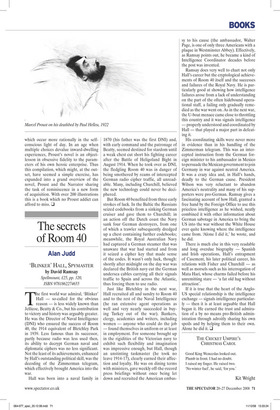The secrets of Room 40
Alan Judd
‘BLINKER’ HALL, SPYMASTER by David Ramsay Spellmount, £25, pp. 320, ISBN 9781862274655 The first world war admiral, ‘Blinker’ Hall — so-called for the obvious reason — is less widely known than Jellicoe, Beatty & Co., but his contribution to victory and history was arguably greater. He was the Director of Naval Intelligence (DNI) who ensured the success of Room 40, the 1914 equivalent of Bletchley Park in 1939. Less famous than its successor, partly because radio was less used then, its ability to decrypt German naval and diplomatic ciphers was no less significant. Not the least of its achievements, enhanced by Hall’s outstanding political skill, was the decoding of the Zimmerman telegram, which effectively brought America into the war.
Hall was born into a naval family in 1870 (his father was the first DNI) and, with early command and the patronage of Beatty, seemed destined for stardom until a weak chest cut short his fighting career after the Battle of Heligoland Bight in August 1914. When he took over as DNI, the fledgling Room 40 was in danger of being smothered by reams of intercepted German radio cipher traffic, all unreadable. Many, including Churchill, believed the new technology could never be deciphered.
But Room 40 benefited from three early strokes of luck. In the Baltic the Russians seized codebooks from a sinking German cruiser and gave them to Churchill; in an action off the Dutch coast the Navy sank four German destroyers, from one of which a trawler subsequently dredged up a chest containing further codebooks; meanwhile, the Royal Australian Navy had captured a German steamer that was unaware that war had started and from it seized a cipher key that made sense of the codes. It wasn’t only luck, though: shortly after midnight on the day war was declared the British navy cut the German undersea cables carrying all their signals traffic to Spain and across the Atlantic, thus forcing them to use radio.
Just like Bletchley in the next war, Hall recruited all and sundry to Room 40 and to the rest of the Naval Intelligence (he ran extensive agent operations as well and very nearly succeeded in buying Turkey out of the war). Bankers, clergy, academics and writers, including women — anyone who could do the job — found themselves in uniform or at least in employment. For someone brought up in the rigidities of the Victorian navy to exhibit such flexibility and imagination was impressive enough, but Hall, though an unstinting taskmaster (he took no leave 1914-17), clearly earned their affection and loyalty. He was on dining terms with ministers, gave weekly off-the-record press briefings without once being let down and recruited the American embas sy to his cause (the ambassador, Walter Page, is one of only three Americans with a plaque in Westminster Abbey). Effectively, as Ramsay points out, he became a kind of Intelligence Coordinator decades before the post was invented.
Ramsay does very well to chart not only Hall’s career but the cryptological achievements of Room 40 itself and the successes and failures of the Royal Navy. He is particularly good at showing how intelligence failures arose from a lack of understanding on the part of the often hidebound operational staff, a failing only gradually remedied as the war went on. As in the next war, the U-boat menace came close to throttling this country and it was signals intelligence — properly understood and coordinated by Hall — that played a major part in defeating it.
His coordinating skills were never more in evidence than in his handling of the Zimmerman telegram. This was an intercepted instruction from the German foreign minister to his ambassador in Mexico to persuade the Mexican government to join Germany in war against neutral America. It was a crazy idea and, in Hall’s hands, deadly to the German cause. President Wilson was very reluctant to abandon America’s neutrality and many of his supporters were pro-German. Ramsay gives a fascinating account of how Hall, granted a free hand by the Foreign Office to use this priceless intelligence as he wished, neatly combined it with other information about German sabotage in America to bring the US into the war without the White House ever quite knowing where the intelligence came from. ‘Alone I did it,’ he wrote, and he did.
There is much else in this very readable and long overdue biography — Spanish and Irish operations, Hall’s entrapment of Casement, his later political career, his relations with Fisher and Churchill — as well as morsels such as his interrogation of Mata Hari, whose charms failed before his unremitting stare — ‘a fat old hag without attraction’.
If it is true that the heart of the AngloUS special relationship is the intelligence exchange — signals intelligence particularly — then it is at least arguable that Hall began it. He earned the trust and admiration of a by no means pro-British administration through adroitly sharing his own spoils and by helping them to their own. Alone he did it. ❑






















































































































 Previous page
Previous page